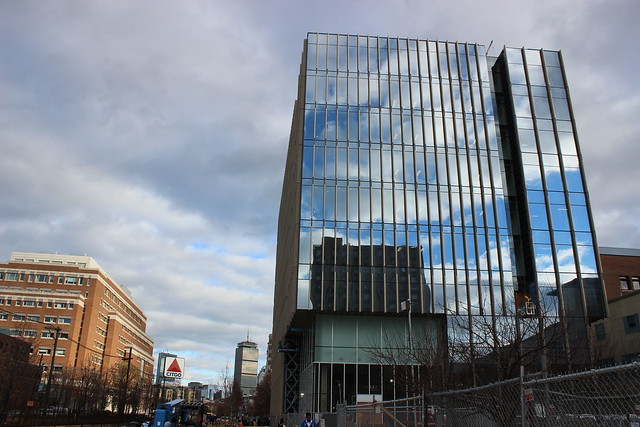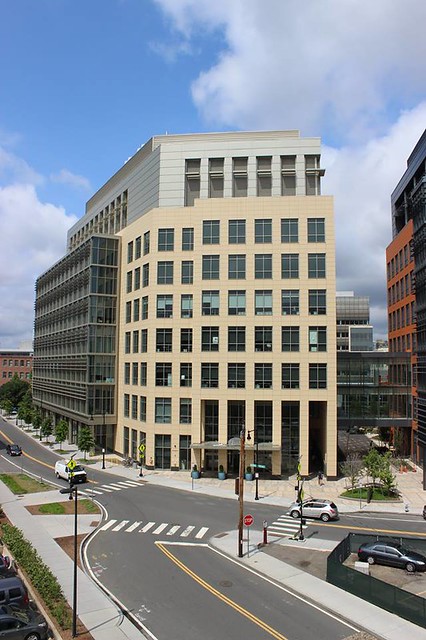Boston Development’s Edge in the Life Science Market 02/06/20

Powered by JM Electrical Company, Inc.
Earlier this summer, Governor Baker doubled down on the state’s tremendous success in the life sciences by asking lawmakers to approve a new five-year, $500 million life sciences investment. Since the Massachusetts Life Sciences Center was launched with an initial 10-year, $1 billion initiative in 2008, Massachusetts solidified and enhanced its reputation as a major hub for research and development. The state now has nearly 1,000 life sciences companies, with roughly 68,000 workers. Of the Commonwealth’s 12 initial public offerings last year, all but three were in the life sciences sector.
By now, most people can identify the underpinnings of this success: great research institutions, a quality workforce, a finance infrastructure that understands the industry’s needs. Currently, the Boston-Cambridge area represents more than one third of the industry’s venture capital funding, outpacing even San Francisco in terms of annual biotech funding from venture capital companies.
Clusters of companies working in close proximity to neighborhoods such as Kendall Square, Longwood Medical and – most recently – the Seaport have also fueled the industry’s collaboration and growth. Vertex Pharmaceuticals initially put the Seaport on the map as a life science hub after building a new world headquarters at Fan Pier in 2011. Since then, several others have followed suit, including Intarcia Therapeutics on Marina Drive, as well as Emulate, Inc. and Ginkgo Bioworks, both in the up-and-coming Innovation and Design Building on Drydock Ave. The newly-reimagined Seaport neighborhood is now the fastest growing part of Boston, stimulating significant economic growth in the city – approximately 5,000 new jobs have been created in the Innovation district, and over 200 new companies have already been formed.

The 1.1-million-square-foot Vertex Pharmaceuticals headquarters in the Seaport District, featuring electrical installation by JM Electrical Company, Inc.
What’s often overlooked is another key component of this success: a development and contractor community that knows how to build the lab spaces and other buildings these companies need. Life science spaces rely on sophisticated systems to keep labs at particular temperatures and to let technicians know when problems arise. The contributions of this region’s developers, builders, and subcontractors - who understand the precision and expertise needed to meet this industry’s special construction requirements – are quiet factors for why Greater Boston’s life science industry remains world-class.
Building biotech facilities requires specialties that the average electrical contractor or construction company in other parts of the country simply may not possess. Increasingly, companies are looking to contractors with expertise in these environments, ensuring these highly complex systems are done correctly. This includes special installation requirements, specialty lab control systems that deal with sensitive work environments and, occasionally, special protocols to complement these installations.

Boston University's new Center for Center for Integrated Life Sciences and Engineering, featuring electrical installation by JM Electrical Company, Inc.
The Boston development industry is continuing to enhance its technical expertise in this area, which enables companies like JM Electrical to keep up with the requirements of these facilities while adding to established service offerings. Particularly with increasing projects at higher education facilities, hospitals and pharmaceutical companies, the building community is experiencing firsthand the reinvigorated demands of the life science boom here in Boston, requiring increased staff as well as field personnel to ensure that all installations are done on time and on budget.
It’s important to recognize just how rare this is. Even some of the country’s most flourishing towns and cities simply lack the local talent to support an industry as sophisticated as Massachusetts’ life science sector. While many here in Boston have become experts in these projects, others areas have had limited exposure. The expertise that many in this market have should not be dismissed when developers are looking to build new life science facilities. Servicing life science facilities with our brand of sophisticated installation and technical expertise has become a touchstone for JM Electrical, and other companies in Greater Boston. And as the building boom continues, working at high-profile, multi-use developments like Pfizer at 610 Main Street in Kendall Square or projects such as Boston University’s Center for Integrated Life Sciences & Engineering provides the building community with first seat access to the growing evolution of the state’s innovation infrastructure. For the next biotech building going up in the region, it’s important that all contractors possess the knowledge and experience needed for this increasingly sophisticated market.

The recently completed Pfizer headquarters in Kendall Square, featuring electrical installation by JM Electrical Company, Inc.
Contributor Bio
JM Electrical Co., Inc. was established over 30 years ago by Paul A. Guarracino who wanted to provide the highest level of quality service to the commercial electrical contracting market. Over the years, this commitment to service along with highly experienced and dedicated personnel has allowed our company to grow its customer base and make significant contributions to major projects in the Greater Boston area.
Today, JM Electrical enjoys a reputation as an industry leader in installing building automation systems and HVAC controls. JM Electrical possesses the technical expertise to assist our customers in executing all projects from selection to installation of the most sophisticated and cost-effective building management systems.
JM Electrical Company, Inc. >>